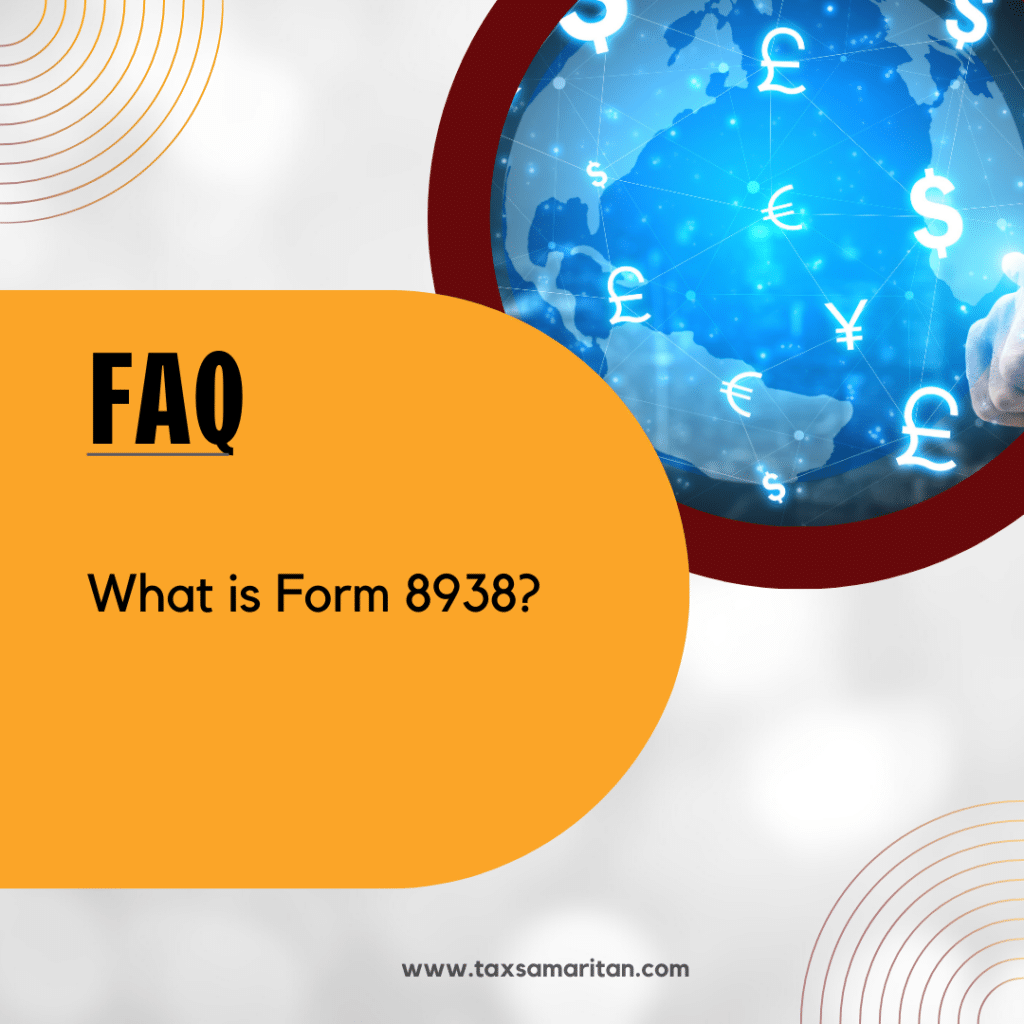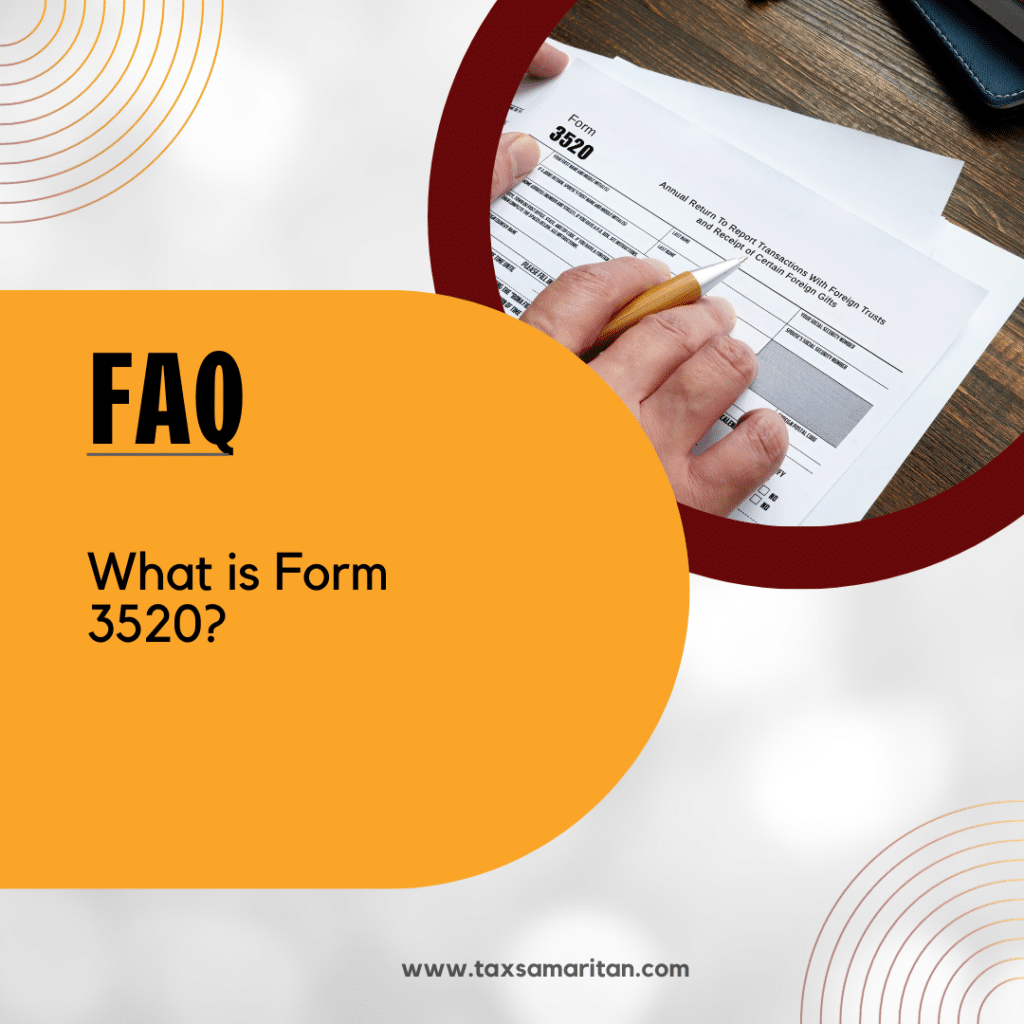FAQs - Forms
What is Form 8938?

Form 8938 is used to report specified foreign financial assets if the total value of all foreign financial assets is more than the reporting threshold:
Specified individuals living in the U.S. include:
· Unmarried individual (or married filing separately): Total value of assets was more than $50,000 on the last day of the tax year, or more than $75,000 at any time during the year.
· Married individual filing jointly: Total value of assets was more than $100,000 on the last day of the tax year, or more than $150,000 at any time during the year.
Specified individuals living outside the U.S.:
· Unmarried individual (or married filing separately): Total value of assets was more than $200,000 on the last day of the tax year, or more than $300,000 at any time during the year.
· Married individual filing jointly: Total value of assets was more than $400,000 on the last day of the tax year, or more than $600,000 at any time during the year
Required taxpayers who fail to file Form 8938 by the due date may be subject to a $10,000 penalty. In addition, if you are notified of the failure by the IRS and continue not to file Form 8938, you may be subject to an additional $10,000 penalty for each 30-day period the form is not filed, limited to $50,000. Further, if an underpayment of tax is involved with an undisclosed specified foreign financial asset, you may be subject to a penalty equal to 40 percent of the underpayment.
What is Form 3520?

Form 3520 and 3520-A are forms required to be filed to report certain transactions with foreign trusts, ownership of foreign trusts and the receipt of large gifts from foreign persons. A foreign gift is money or other property received by a U.S. person from a foreign person that the recipient treats as a gift or bequest and excludes from gross income. Foreign gifts must be reported if they exceed:
· More than $100,000 from a nonresident alien individual or a foreign estate (including foreign persons related to that nonresident alien individual or foreign estate)
· More than $15,797 from foreign corporations or foreign partnerships (including foreign persons related to such foreign corporations or foreign partnerships)
Taxpayers who cannot demonstrate reasonable cause for failing to file on time or reporting incorrect information may be subject to an initial penalty equal to the greater of $10,000 or the following (if applicable):
· 35 percent of the gross value of any property transferred to a foreign trust for failure by a U.S. transferor to report the creation of or transfer to a foreign trust.
· 35 percent of the gross value of the distributions received from a foreign trust for failure by a U.S. person to report receipt of the distribution.
· 5 percent of the gross value of the portion of the foreign trust’s assets treated as owned by a U.S. person for failure by the U.S. person to report the U.S. owner information. Such U.S. person is subject to an additional separate 5 percent penalty (or $10,000 if greater), if the foreign trust (a) fails to file a timely Form 3520-A, or (b) does not furnish all required information or includes incorrect information.
Additional penalties may be imposed if the owner continues noncompliance after being notified by the IRS.
What is Form 8621?

Form 8621 is required by U.S. citizens and residents that are direct or indirect shareholders of a Passive Foreign Investment Company (PFIC). Absent any exception, each stock that is held during the year is required to be reported on a separate Form 8621 under the following circumstances:
· Receives certain direct or indirect distributions from a PFIC
· Recognizes gain on a direct or indirect disposition of PFIC stock
· Is reporting information with respect to a QEF or section 1296 mark-to-market election
· Is making an election reportable in Part II of the form
· Is required to file an annual report pursuant to section 1298(f). See the Part I instructions, later, for more information regarding the person that must file pursuant to section 1298(f)
A foreign corporation is a PFIC if it meets either the income or asset test described below:
· Income test – 75 percent or more of the corporation’s gross income for its taxable year is passive income (as defined in section 1297(b)).
· Asset test – At least 50 percent of the average percentage of assets (determined under section 1297(e)) held by the foreign corporation during the taxable year are assets that produce passive income or that are held for the production of passive income.
There is not a specific penalty for failure to file Form 8621. However, the regulations coordinate the Form 8621 filing requirements with the Form 8938 filing requirements. Section 6038D requires a U.S. individual to disclose any directly held foreign financial assets on Form 8938, if the aggregate value of the individual’s foreign financial assets exceeds the filing threshold. An exception to the disclosure requirement applies to any foreign financial asset the individual reports on another disclosure form, such as Form 8621. A U.S. individual shareholder who fails to disclose a directly held PFIC investment on either Form 8621 or Form 8938 when required can be subject to a $10,000 penalty under §6038D(d).
